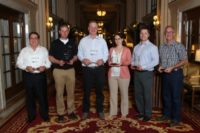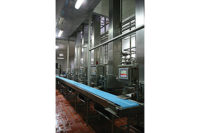Joseph Gallo Farms might just be the very model of a modern major cheesemaker. It’s all about use and re-use. Nothing goes to waste at this central California cheesemaking and dairy farming business. What little waste there is is re-purposed into salable ingredients, energy or gray water.
The cheesemaking operation in Atwater turns watery whey into powdered dairy ingredients and animal feed. What’s left flows to an anaerobic digester for treatment and then is discharged into a lagoon. This water irrigates the fields that grow crops to feed the cows that produce the milk.
The dairy farming operation produces milk (for cheesemaking) along with copious amounts of manure, which are also pumped to the digester. The gas that is captured in the digester is burned to power the electrical generators in the cheese plant. The bio-fuel reduces the company’s dependence on the city’s electrical grid. Eventually, the business could be a net seller of electricity.
So what business is Joseph Gallo Farms actually in? Is it an energy producer, a water treatment facility, a dairy farm or a cheesemaker? The answer is yes. It’s all that and more.
In March, owner Michael Gallo went to Washington, D.C., to pick up an award from the Innovation Center for U.S. Dairy for its eco-friendly and sustainable business practices. “As a farmer, you want to be sustainable,” he said, adding that one “can always do more, much more.”
This wasn’t the first time the cheesemaker was honored for its environmental practices. In 2013, the company received the Governor’s Environmental and Economic Leadership Award from the state of California. The state honored Gallo for its sustainable farming and cheesemaking. The award has been called California’s highest and most prestigious environmental honor. It is bestowed upon individuals, organizations and businesses for exceptional leadership in voluntary achievements that help conserve resources, protect and enhance the environment, and build public-private partnerships. Gallo noted that these practices also created new jobs.
One might be forgiven for thinking that Joseph Gallo Farms is just an eco-friendly food processor. In fact, Joseph Gallo Farms is an award-winning cheesemaker with award-winning manufacturing processes. (See related article , “Joseph Gallo Farms' sustainable practices, customer service help define 'quality'.”)
The company has a wall of product quality awards dating from 1985 lining the walls in its headquarters, an old farm house that was relocated from elsewhere on the farm. In 2013, the company’s Monterey Jack received a silver medal at the World Cheese Awards (presented by the Guild of Fine Food) which had over 2,700 entries from 34 countries. In 2013, Monterey Jack and Mild Cheddar cheeses earned bronze medals at England’s Frome Global Cheese Awards, which had 1,200 entries. It won 13 medals (including five golds) at the 2013 Los Angeles International Dairy Competition and three medals at the California State Fair.
Formats and customers
Joseph Gallo Farms makes Monterey Jack (the best seller), various Cheddars, gouda, Colby, Provolone, Muenster and mozzarella. In all, the company produces 150 natural cheeses in chunk, loaf, sliced and shredded formats sold under the Joseph Farms brand. The company serves the retail market primarily (independent groceries, supermarket chains and club stores). Other customers are foodservice and industrial accounts.
At the helm of this family-owned business is Mike Gallo, the son of the founder Joseph Edward Gallo. Joseph’s older brothers were winemakers Ernest and Julio Gallo from nearby Modesto, Calif. (They were not affiliated with the cheesemaking business.)
Joseph founded a farm in 1946, growing grapes and other crops and raising cattle. In 1979, he started a dairy. He built a cheese plant in 1982, hired a Wisconsin cheesemaker and began making product the next year. In 1991, the business was the first U.S. cheesemaker to label its products with an FDA-certified “no artificial hormones” guarantee.
Mike attended nearby Fresno State University and upon graduating went into the family business. At one time, Gallo had a herd of 22,000 dairy cows. When the economy soured and the input costs of feed exceeded the value of milk, Gallo scaled back his herd. He is still farming and using his own milk, but now he also sources additional milk from local certified dairies.
The company is a member of national groups, including the International Dairy Foods Association, the U.S. Dairy Export Council and the International Deli-Dairy-Bake Association. Mike Gallo serves on the California State Board of Food & Agriculture and he is on the board of trustees of the University of California Merced.
Between the artisans and the giants
In a sense, Joseph Gallo Farms is at an awkward age. It is older and larger than start-up artisan cheesemakers, yet it is not as large as billion-dollar commodity cheesemakers. That makes it difficult to compete. As a result, Mike Gallo is investing in equipment to make the company faster and more efficient. Though the company sells into the Western states, high freight costs keep it out of the East.
The cheesemaker ranks No. 85 on the Dairy 100, Dairy Foods’ ranking of the largest dairy processors in North America with 2013 sales of $153 million. It is the 10th largest dairy processor based in California. Hilmar Cheese, in the nearby town of Hilmar, has $2 billion in annual sales.
What helps Joseph Gallo Farms succeed is its consistent quality and its local roots, Gallo said. “People know that we are a high-quality yet moderately priced cheese. We take pride in our product,” Gallo said.
Customers (from Walmart to small ethnic grocers) know that the cheese will taste the same, batch after batch. The local, farmer-owned roots also resonate with consumers.
“We don’t make enough [cheese] to have our own R&D department,” Gallo said, so he relies on suppliers and retailers to help with flavors and ideas.
Gallo said he sees export opportunities in finished consumer products as well as in industrial products and dairy ingredients. As an exporter to Mexico and Asia, Gallo needs to know what is happening outside the United States. He said he reads five newspapers a day in order to keep up with current events. World markets are changing dairy producing and dairy processing, Gallo said, quickly adding that being in a world market “is not as much fun as it sounds.”
He also has to stay current with consumer preferences here in the United States.
“You have to change with the market,” he said.
Keeping up with consumers
Retail customers are more demanding than commodity customers, he said. Consumers’ tastes change, so cheesemakers have to be ready with different products, like variety packs or spicier flavors. Shredded cheeses are popular with shoppers so Gallo invested in a new shredder that is five times faster than the former machine.
In addition to new cheeses and formats, Joseph Gallo Farms will be unveiling new brand packaging this autumn and into 2015, said Director of Marketing Patrick Sai.
Dairy ingredients from whey are sold to industrial customers who use the powders in beverages and prepared foods. The company is also investing in equipment to get more protein from the whey. Some protein is getting into the animal feed product called Procream.
“That’s a waste of valuable product,” Gallo said, adding that he aims to re-capture the protein and get some value from it. But in order for Joseph Gallo Farms to develop and sell new whey products, the cheesemaker will have to upgrade equipment.
The last year has been one of great change in personnel and company culture. Gallo hired new upper management. Gallo said there is a new vision and new culture at the company. His aim, he said, is to be more customer-service oriented. That means all employees, from the janitor to the CEO, he said.
“Training programs teach that it is not enough to just do your job. You must also think about customer service. Everything is connected,” he said.
The changes going on at the farm and in the production plant excite Gallo, he said. “There is something new every day, whether it’s the new packaging, new product line or a new way to reduce our carbon footprint and save water usage.”









